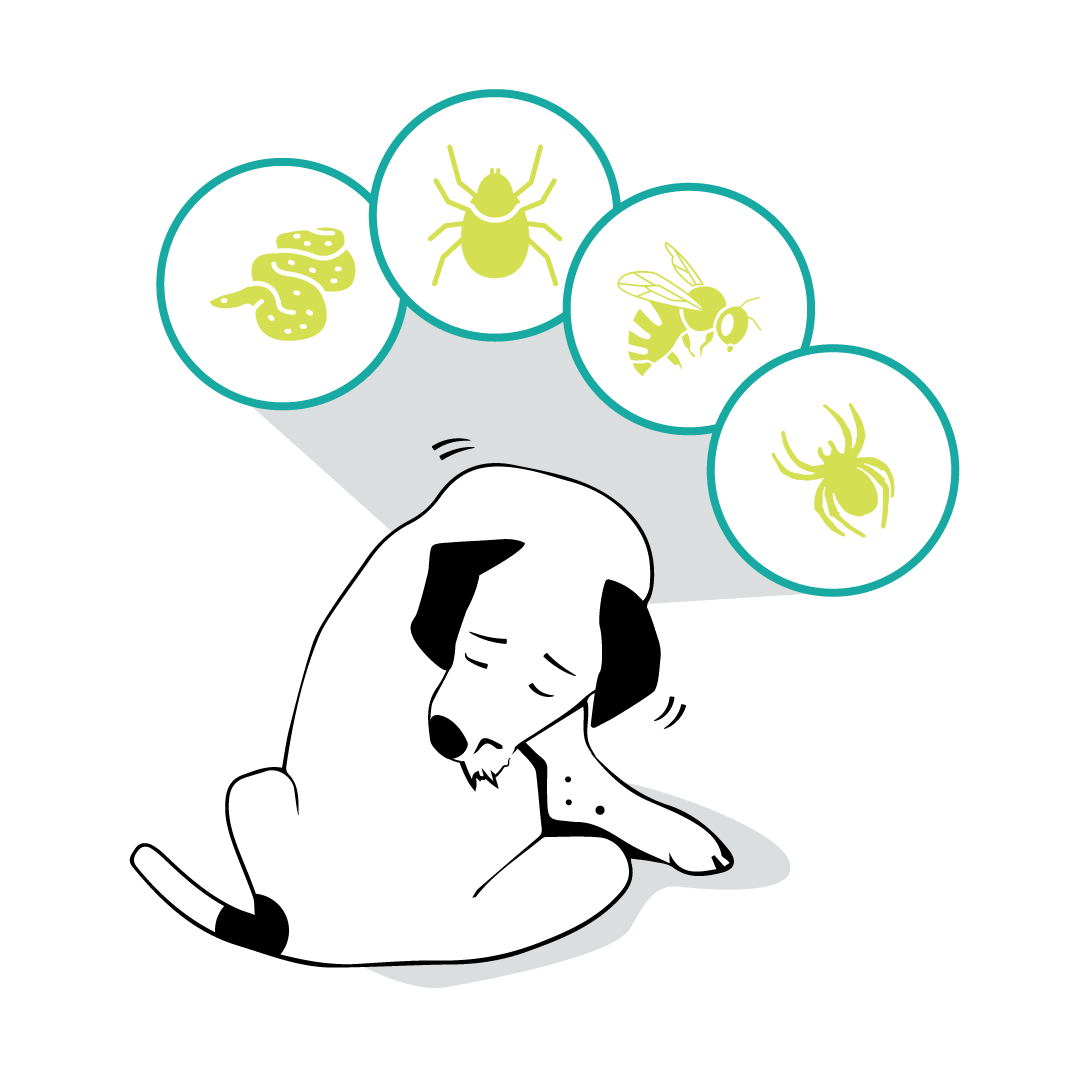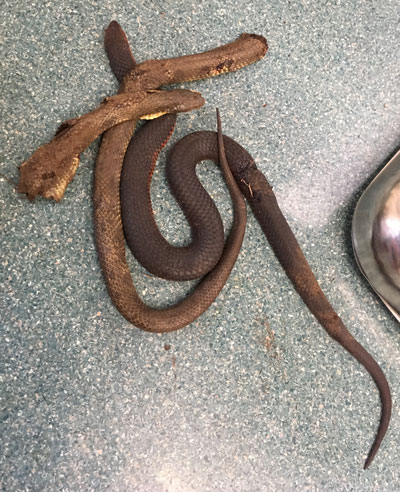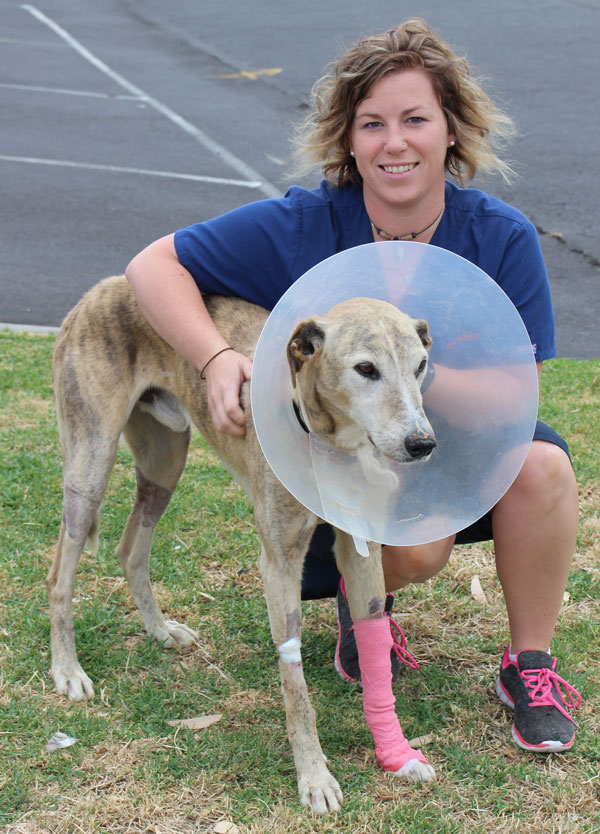The great outdoors …camping trips, swims at the beach or walks in the bush means your pet is exposed to a range of insects! and their bites (think snakes, ants, spiders, ticks, wasps and bees).
What to do
- Think carefully about where let your dog walk or swim to avoid accidental bites or stings
- Watch your pooch when they go exploring (i.e. sticking their nose in a dark hole!)
- Ensure your pet is fully protected with up-to-date vaccinations, parasite & tick control
What are the symptoms of a sting or a bite?
- Sudden onset of pain e.g. yelping, whining, limping.
- Licking, chewing, pawing and scratching at the bite or sting site.
- Redness and swelling — this can be local (i.e. around the bite or sting site only) or occur all over the body, especially on the face.
- Hives — also known as welts or urticariaâ These are lumps that can suddenly appear on the body in response to an allergic reaction.
- Vomiting.
- Coughing or difficulty breathing.
- Sudden collapse and unconsciousness— this reaction is called anaphylaxis and is often fatal if not treated quickly.
- Your pet should be examined immediately by a veterinarian if they have been outside or in the garden, and then vomit, have trouble breathing, collapse or develop facial swelling

- If the stinger can be easily found, you can attempt to scrape it out with a thin, rigid object. Tweezers can be used to remove the sting, ideally without placing any pressure on the venom sac. If you do not feel confident that you can remove the sting without putting pressure on the venom sac, let a vet remove it (as you risk additional venom being injected into your pet).
- You can apply a cool compress to the bite site to provide relief while waiting to see a vet or whilst transporting your pet.
- Do not ever give your pet human medication as the drugs and doses are different for animals and consequences are unpredictable. These may include heavy sedation, dangerously low blood pressure, vomiting and diarrhoea. It is important to only ever give medication prescribed by your vet.
What to expect at the vet.
- Injectable antihistamines.
- Injectable anti-inflammatory medications.
- In severe cases injectable adrenaline.
- Oxygen – this is needed if your pet is having difficulty breathing or is in shock.
- Intravenous fluid therapy and medications – if your pet is in shock.
- The majority of insect bites and stings are quick and easy to treat and have an excellent prognosis. Anaphylaxis, however, is a very serious problem resulting in life-threatening shock that can lead to organ damage (and even failure) in some cases.
- These patients require hospitalisation for intensive care, occasionally for extended periods of time. With appropriate and timely medical therapy, many of these patients recover.

Avoiding Snake Bites in Dogs and Cats
Snakes are not just a danger to people our pets all too often come across them and the outcome can be devastating. Dogs and cats are at most risk from snake bite over summer with our vets often seeing animals after a snake bite, particularly farm pets.
Keep your yard clear of undergrowth, debris, holes, tools etc which make good hiding spots for snakes. Old corrugated iron sheeting and other objects left lying around are the perfect spot for snakes to warm themselves or hide beneath. Keep rodents away by limiting feed scraps as they may attract snakes. Make sure your dog is on a lead and under control when in a dangerous snake areas, such as long grass and around dams and other water catchment areas where snake navigate towards.
What to look out for if your pet is bitten by a snake.
Signs of Snake Bite
Snake venom acts in a number of ways and signs increase with time. Animals, particularly cats, are often not noticed until the toxin has started to work. The toxins damage the nervous system causing progressive paralysis, decreases blood clotting, damages muscle and has secondary effects on kidneys. The initial sign of a bite, if you happen to be around, often include: vomiting, confusion, collapse and loss of consciousness.
Often the animal appears to recover after 30 minutes or so, then other signs slowly develop. The other signs usually start to develop in a few hours but sometimes are not noticed for 24 hours. Because of their behaviour, cats are often more affected before it is noticeable.
Often the first sign of a snake bite is the pupils in the eyes become enlarged and do not close in bright light.
Another sign is the animal weak in the hind legs. Dogs are usually noticed wobbly in the hind legs, while cats are often fully paralysed before they are noticed. As the effects of the toxin increase, the animal will have trouble breathing, may have red-brown urine due to muscle damage and will have poor circulation.
What to do if my animal is bitten?
Try to stay calm and take your animal to a vet as soon as possible. Ring the vet clinic first and organise the details to avoid delays at the other end. IF, the snake is found dead, bring the snake in as well, but do NOT attempt to kill the snake or you may become a victim.
What Will the Vet Do
The vet will assess your animal and decide on the best treatment. Most dogs and many cats will die without antivenom. If possible, the vet will identify which antivenom is needed but we have less variation in our area than other places. The anti-venom needs to be given carefully, with fluids and other medications. The animal will stay on fluids for an extended time to aid recovery and decrease secondary damage. In some cases oxygen may be given.
If unsure if the animal has been bitten, a swab for venom may be attempted, but often blood is tested for muscle and clotting damage. The animal will be monitored, given fluids, pain relief and other medication until the animal is OK to go home. Many, but unfortunately not all snake bitten dogs, will recover.
Check out a very brave Rory “Snake bite survivor”.
Brave Rory
We have another snake bite survivor story you might like to read. Brave Rory tackled not one but two snakes and, after a long battle, survived to be reunited with his loving family.




Recent Comments